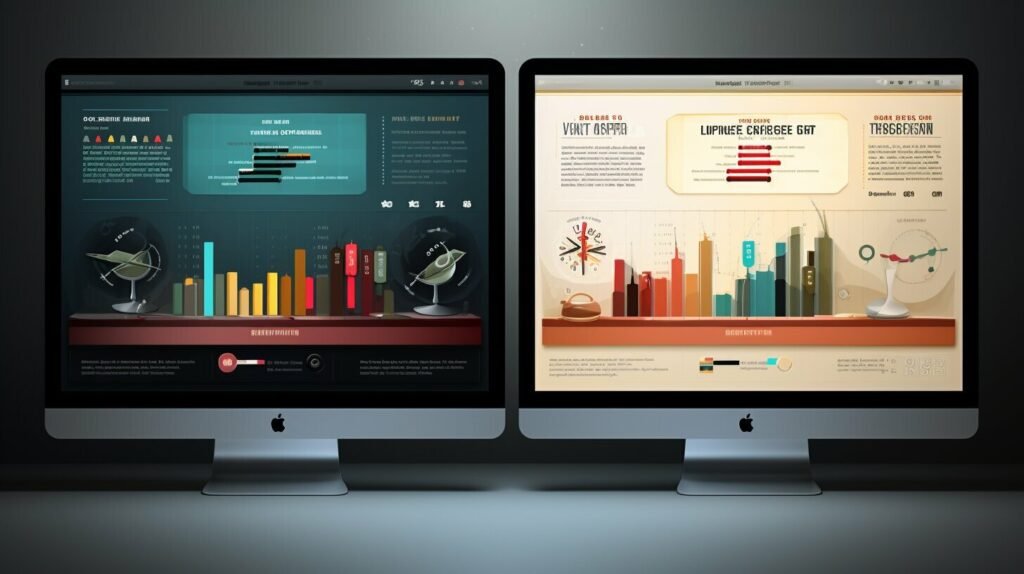Measuring campaign effectiveness is crucial for optimizing marketing strategies and improving return on investment (ROI). Without proper measurement, it’s impossible to know if your campaigns are performing as expected. Fortunately, there are key strategies you can use to track and evaluate campaign performance.
From setting clear objectives and goals to analyzing customer data and feedback, there are many methods for measuring campaign effectiveness. Each strategy provides valuable insights into the success of your marketing efforts.
Key Takeaways:
- Measuring campaign effectiveness is essential for optimizing marketing campaigns and improving ROI.
- There are several key strategies you can use to track and evaluate campaign performance.
- Each strategy provides valuable insights into the success of your marketing efforts.
Setting Clear Objectives and Goals
Before launching a marketing campaign, it is essential to set clear objectives and goals. This step allows you to focus your efforts, measure your success, and make data-driven decisions moving forward.
When establishing your objectives and goals, it is essential to consider the specific metrics you will use to measure your success. These metrics will vary depending on the nature of your campaign, but common examples include website traffic, lead generation, conversion rates, and sales revenue. By identifying which metrics are most important to you, you can create a more targeted and effective campaign that aligns with your business objectives.
It’s important to note that your objectives and goals should be SMART—specific, measurable, achievable, relevant, and time-bound. This framework ensures that your goals are well-defined and realistic, making it easier to track your progress and make adjustments along the way.
For example, if you’re launching a social media campaign, your objectives might include increasing your follower count, boosting engagement rates, and driving traffic to your website. To measure success, you might track metrics like click-through rates, shares, and comments, as well as website traffic and conversion rates.
Overall, setting clear objectives and goals is a key strategy for measuring campaign effectiveness. By defining what you hope to achieve and how you will measure success, you can optimize your marketing efforts, evaluate your ROI, and make data-driven decisions that drive business growth.

Utilizing Key Performance Indicators (KPIs)
In order to assess the effectiveness of a marketing campaign, it is essential to use pertinent key performance indicators (KPIs). These metrics offer valuable insights into how customers engage with campaign content and help companies optimize results and improve ROI.
There are various types of KPIs available for measuring campaign effectiveness, including conversion rates, click-through rates, and engagement metrics. Conversion rate is the percentage of users who visit a website and take a desired action, such as making a purchase or filling out a form. Click-through rate is the percentage of users who click on a link in a marketing message. Engagement metrics encompass measures of social media interaction, such as likes, comments, and shares.
When selecting KPIs, it is important to choose metrics that align with campaign objectives and strategic goals. This helps to ensure that the data collected is relevant and actionable.
| KPI Type | Description |
|---|---|
| Conversion Rate | Percentage of users who take a desired action on a website or landing page. |
| Click-Through Rate | Percentage of users who click on a link in a marketing message. |
| Social Media Engagement Metrics | Measurements of comments, likes, shares, and other interactions that occur on social media platforms. |
Using KPIs to measure campaign effectiveness requires ongoing monitoring and analysis. Regular tracking of KPI data allows companies to adjust campaign strategies and optimize results in real-time. This enables businesses to achieve their marketing objectives and drive overall business success.

Implementing A/B Testing
One of the most effective methods for measuring campaign effectiveness is through A/B testing. A/B testing, also known as split testing, involves creating two versions of a campaign element, such as an ad or email subject line, and testing them against each other to determine which performs better. By conducting experiments and comparing the performance of different campaign elements, marketers can optimize their strategies and improve overall campaign impact.
When implementing A/B testing, it is important to carefully choose which elements to test and to only test one element at a time. This will help ensure that any changes in performance can be attributed to the specific element being tested. It is also important to track and analyze the results of the tests, adjust the campaign elements accordingly, and continue testing to further improve campaign effectiveness.
For example, a clothing retailer may create two different versions of an email promotion, with one version featuring a discount code in the subject line and the other version featuring a free shipping offer. By sending each version to a randomly selected portion of their email list and tracking which version generates more clicks and conversions, the retailer can determine which offer is more effective and adjust future campaigns accordingly.
 Image source: https://seowriting.ai/32_6.png
Image source: https://seowriting.ai/32_6.pngAnalyzing Customer Data and Feedback
Customer data and feedback play a crucial role in measuring the effectiveness of a marketing campaign. By analyzing customer behavior, preferences, and feedback, you can gain valuable insights into the success of your marketing efforts.
One way to collect customer feedback is through surveys. Surveys can help you understand how customers perceive your brand, products, and services. You can also use surveys to collect feedback on specific aspects of your marketing campaign, such as messaging, creative, or offers. By leveraging the insights gathered from surveys, you can optimize your marketing strategy and improve campaign effectiveness.

Another way to analyze customer data is by measuring engagement on your website and social media channels. By tracking engagement metrics such as likes, shares, comments, and click-through rates, you can gain valuable insights into how your target audience is interacting with your content. This can help you identify which types of content are resonating with your audience and which ones are not.
Finally, monitoring customer feedback and reviews can also provide valuable insights into campaign effectiveness. By monitoring customer sentiment and feedback on social media channels, review platforms, and other online forums, you can gain an understanding of how customers perceive your brand and products. This can help you identify areas for improvement and optimize your marketing strategy accordingly.
Monitoring Social Media Metrics
Social media has become a crucial component of marketing campaigns, and monitoring social media metrics is essential in measuring campaign effectiveness. Social media platforms provide valuable data on engagement, reach, sentiment, and other key performance indicators that can help evaluate the success of marketing efforts.
Tracking engagement metrics such as likes, comments, shares, and reactions on social media can provide insights into customer behavior and preferences. This information can help businesses create more targeted and effective marketing campaigns in the future.
Reach metrics, such as the number of followers, impressions, and reach, can give businesses an idea of the number of people their campaign is reaching. This data can help businesses understand the effectiveness of their social media strategy and identify areas for improvement.
Sentiment analysis, measuring the tone of mentions and comments, can provide businesses with an understanding of how their target audience feels about their brand and their campaign. This information can help businesses adjust their messaging and strategy to better resonate with their target audience.

Businesses can use a variety of tools to monitor social media metrics, such as Facebook Insights, Twitter Analytics, and Instagram Insights. These tools provide businesses with the ability to track key performance indicators and measure the impact of their social media campaigns.
By monitoring social media metrics, businesses can better understand the effectiveness of their marketing efforts. This data can help businesses optimize their social media strategy and ultimately drive better results.
Utilizing Surveys and Market Research to Measure Campaign Effectiveness
Surveys and market research can provide valuable insights into the success of a marketing campaign. Collecting feedback from target audiences can help evaluate the effectiveness of the campaign and identify areas for improvement.
One way to conduct market research is through online surveys. Surveys can help evaluate the overall impact of the marketing campaign and identify which elements of the campaign were most effective in reaching the target audience. Surveys can also be used to gauge customer satisfaction and identify areas for improvement.
Another way to conduct market research is through focus groups. Focus groups allow marketers to gather feedback from a small group of individuals in a more in-depth and personal way. These groups can provide valuable insights into customer behavior, preferences, and opinions on the marketing campaign.
Market research can also involve analyzing broader trends and data related to the industry and target audience. This can include analyzing competitor strategies, industry benchmarks, and market trends. By gathering this information, marketers can better understand how their campaign is performing within the larger context of the industry and adjust their strategies accordingly.
Overall, surveys and market research can provide valuable insights into the effectiveness of a marketing campaign. By gathering feedback from target audiences and analyzing broader industry trends, marketers can optimize their strategies and improve their return on investment.

Analyzing Sales and Revenue Data
One of the most important metrics for measuring campaign effectiveness is sales and revenue data. By tracking the number of sales and revenue generated from the campaign, marketers can gain valuable insights into the impact of their marketing efforts.
There are several key sales and revenue metrics that marketers should focus on when evaluating campaign performance. These include:
| Sales Metrics | Revenue Metrics |
|---|---|
| Number of units sold | Total revenue generated |
| Average order value | Revenue per customer |
| Conversion rate | Cost per acquisition |
By analyzing these metrics, marketers can determine which campaigns and tactics are driving the most sales and revenue. This information can then be used to optimize marketing strategies and improve overall campaign performance.
It is important to note that sales and revenue data should be evaluated in conjunction with other metrics, such as website traffic and customer engagement. By analyzing multiple metrics, marketers can gain a more comprehensive understanding of campaign effectiveness and make more informed decisions about future marketing efforts.
 In the next section, we will explore the role of web analytics tools in measuring campaign effectiveness.
In the next section, we will explore the role of web analytics tools in measuring campaign effectiveness.Utilizing Web Analytics Tools
Web analytics tools provide a wealth of data that can help measure campaign effectiveness. By tracking website traffic, conversion rates, and user behavior, companies can evaluate the success of their marketing campaigns and identify areas for improvement.
One popular web analytics tool is Google Analytics, which offers a range of features to help measure campaign effectiveness. Companies can track the number of website visits, the length of time users spend on each page, and the bounce rate (the percentage of visitors who leave the site after viewing only one page).
In addition, Google Analytics can help measure the impact of specific marketing campaigns by tracking the source of website traffic. By setting up campaign tracking codes, businesses can see how many users came to their site as a result of a specific ad or promotional campaign.
Another useful web analytics tool is Kissmetrics, which allows companies to track user behavior on their site from the moment they arrive to the point of conversion. This information can help identify areas where website visitors are dropping off and adjust marketing strategies accordingly.
Web analytics tools can also help measure the effectiveness of individual marketing channels, such as email marketing campaigns. By tracking email open and click-through rates, businesses can determine which emails are most effective in driving website traffic and conversions.
Overall, web analytics tools provide valuable insights into the success of marketing campaigns and help companies make data-driven decisions to optimize their marketing strategies and drive business success.

Conclusion
Measuring campaign effectiveness is essential for optimizing marketing strategies and improving ROI. By setting clear objectives and goals, utilizing key performance indicators, implementing A/B testing, analyzing customer data and feedback, monitoring social media metrics, conducting surveys and market research, analyzing sales and revenue data, and utilizing web analytics tools, businesses can evaluate the success of their marketing campaigns and make informed decisions to drive overall business success.
It is important to note that no single method can provide a complete picture of campaign performance. Rather, businesses must use a combination of strategies to evaluate the impact of their marketing efforts. By consistently measuring campaign performance and adjusting strategies accordingly, businesses can optimize their marketing efforts and achieve their desired outcomes.
What Are the Benefits of Continuous Evaluation and Optimization in Measuring Campaign Effectiveness?
Continuous evaluation and optimization are essential components in measuring campaign effectiveness. By implementing evaluation optimization strategies explained, businesses can identify areas of improvement and make data-driven decisions. This iterative process allows for better targeting, precise messaging, and improved ROI. Regular evaluation and optimization ensure that campaigns are constantly optimized, leading to enhanced effectiveness and ultimately, better campaign performance.
How Can Data Analytics Improve the Effectiveness of BTL Marketing Campaigns?
Data analytics has become a game-changer in the world of marketing. By harnessing the power of data, businesses can enhance btl marketing campaigns with data analytics, enabling them to analyze consumer behavior, identify target segments, and tailor communication accordingly. Data-driven insights help in optimizing campaign strategies, increasing engagement, and ultimately driving better conversion rates for effective BTL marketing.
How Can Guerrilla Marketing Tactics Impact the Effectiveness of Campaigns?
Guerrilla marketing tactics for success can greatly impact the effectiveness of campaigns. By utilizing unconventional and low-cost methods, companies can create memorable and attention-grabbing campaigns that resonate with their target audience. These tactics can help increase brand visibility, create buzz, and drive engagement, ultimately leading to campaign success.
FAQ
Q: What are the key strategies for measuring campaign effectiveness?
A: The key strategies for measuring campaign effectiveness include setting clear objectives and goals, utilizing key performance indicators (KPIs), implementing A/B testing, analyzing customer data and feedback, monitoring social media metrics, conducting surveys and market research, analyzing sales and revenue data, and utilizing web analytics tools.
Q: Why is it important to set clear objectives and goals?
A: Setting clear objectives and goals is crucial for measuring campaign success and evaluating the impact of marketing efforts. It provides a benchmark against which campaign performance can be measured, helping to identify areas for improvement and optimization.
Q: What are key performance indicators (KPIs) and how do they help measure campaign effectiveness?
A: Key performance indicators (KPIs) are measurable metrics used to evaluate the success of a marketing campaign. They can include conversion rates, click-through rates, and engagement metrics, among others. KPIs provide valuable insights into the effectiveness of a campaign and help track and assess its performance.
Q: How does A/B testing contribute to measuring campaign effectiveness?
A: A/B testing involves conducting experiments and comparing the performance of different campaign elements. It helps measure campaign effectiveness by providing data on which elements are more successful in driving desired outcomes. By optimizing campaigns through A/B testing, marketers can improve overall impact and effectiveness.
Q: Why is analyzing customer data and feedback important for measuring campaign effectiveness?
A: Analyzing customer data and feedback provides valuable insights into the success of a marketing campaign. It helps assess customer behavior, preferences, and satisfaction, which can guide improvements and adjustments to enhance campaign effectiveness.
Q: How can monitoring social media metrics contribute to measuring campaign effectiveness?
A: Monitoring social media metrics, such as engagement, reach, and sentiment, helps measure the effectiveness of marketing campaigns. It provides insights into how the target audience is responding to the campaign, allowing marketers to make data-driven decisions and optimize strategies.
Q: What role do surveys and market research play in measuring campaign effectiveness?
A: Surveys and market research enable marketers to collect feedback from target audiences, helping to measure campaign effectiveness. By understanding the perception and response of customers, marketers can evaluate the success of their campaigns and make informed decisions for future strategies.
Q: How does analyzing sales and revenue data contribute to measuring campaign effectiveness?
A: Analyzing sales and revenue data is crucial for measuring campaign effectiveness. By tracking sales performance and revenue generated from the campaign, marketers can gauge the impact of their marketing efforts and determine the return on investment (ROI).
Q: What role do web analytics tools play in measuring campaign effectiveness?
A: Web analytics tools provide valuable data on website traffic, conversion rates, and user behavior, allowing marketers to measure the effectiveness of their campaigns. These tools provide insights into campaign performance, helping to identify areas for improvement and optimization.
Q: How do the key strategies for measuring campaign effectiveness contribute to business success?
A: The key strategies for measuring campaign effectiveness optimize marketing efforts, improve return on investment (ROI), and drive overall business success. By using these strategies, marketers can make data-driven decisions, improve campaign performance, and achieve marketing objectives.





